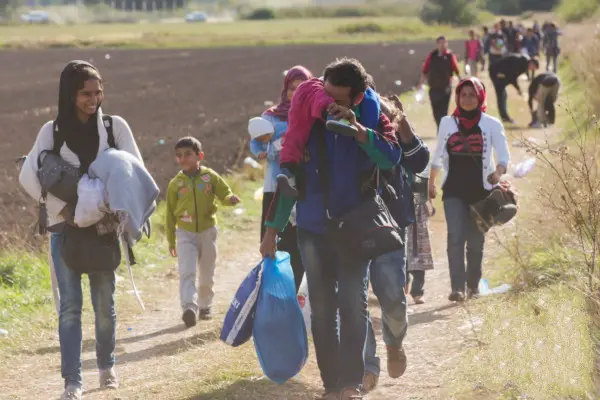Bavaria, the southern state of Germany, the main entrance to the largest economic power of the European Union (EU) for immigrants coming from the Middle East, has greeted since last summer thousands of hundreds of refugees who fled their homeland conflict.
The refugees were once warmly welcomed by local citizens at the central railway station of the state capital Munich after a long arduous journey.
However, less than five months later, the sustained flood of refugees to Europe has unexpectedly turned to an unprecedented trouble for the EU.
The refugee issue was regarded by around 600 participants, including dozens of heads of governments, transnational institutions and departments for foreign affairs or defense, as a hot spot at the three-day Munich Security Conference (MSC) closed on Sunday.
The participants called for putting words to actions with solidarity in order to weather the storm of the most significant refugee crisis across Europe since the Second World War.
COMMITTED TO DEALLING WITH ROOT CAUSES
"Given the driving forces like demography, demand for labor or economic disparities, we believe that large scale of migration is inevitable," said William Lacy Swing, Director General of the International Organization for Migration (IOM), in Munich.
Even so, many speakers figured out at various panels, root of the ongoing massive migrant crisis in Europe lay in the ceaseless violence and conflict in the Middle East, particularly in Syria.
"Without dealing with the root causes, whatever you do, however you control the borders ... you cannot fully stop the migration flows," said Turkish Foreign Minister Mevlut Cavusoglu addressing a panel.
Since the breakout of the Syrian conflict nearly half decade ago, the dispute over the Syrian issue between the West led by the United States and Russia has been increasingly acute.
It was the United States that pushed down the first "Domino" yet without endeavoring to hold back the consequences of conflicts and crisis, which led to the growing sophistication of the current situations such as flood of refugees in Europe, Qu Xing, a renown Chinese scholar of international relations, said in an interview with Xinhua.
Hard-won agreement was made by the 17-member International Syria Support Group (ISSG) in Munich hours before the opening of MSC, saying to open up channels for delivering humanitarian aid to those in need in Syria within the week, a cessation of hostilities across Syria will be carried out within a week and Syrian peace talks need to restart in Geneva as soon as possible.
As a next step, it is important to ensure that the reached agreement will be implemented, said Chinese Foreign Minister Wang Yi in Munich.
U.S. Secretary of State John Kerry said on Saturday that a lot of work must be done in order to ensure an effective "cessation of hostilities" within the week.
LOOKING FOR SOLUTIONS TO SHORT-TERM CHALLENGES
Over 1 million people driven out of their countries entered Europe last year, more than four times as many as the year 2014, according to the Geneva-based IOM, which led to a series of consequences in European society, covering extended Right-wing populism and growing burdens on social security management as well.
So far five EU member states plus Norway have introduced temporary border controls to deal with the overwhelming refugee flows, which raised general concerns about destiny of the existing Schengen area.
"Reopen Schengen will not be easy if we close it," Italian Foreign Minister Paolo Gentiloni said at MSC, any single national decision that can create irreversible consequences will not be accepted.
Meanwhile, some diplomats called for strengthening controls, collaborating to fight against illegal migration, instead of closing borders.
Illegal immigration is neither in the interest of refugees, nor in the interest of countries, Turkish Foreign Minister Mevlut Cavusoglu pointed out, saying better coordination will be needed in Europe to fight against "traffickers", for instance by strengthening international network.
Implementing humanitarian aid to those who are still living in chaos caused by conflicts, was proposed by some speakers at MSC, which maybe taper or remove the motivation of those in the Middle East to cross the border into Europe.
"We should support people to stay in the region until the civil war is over ... we have to provide them with food, housing, schooling and access to labor markets," said Peter Altmaier, head of the Federal Chancellery and Federal Minister for Special Tasks of Germany, who is regarded as German Chancellor Angela Merkel's closest advisor.
Cavusoglu told a panel that Turkey is building new refugee camps on the other side of border, among which three camps locate in northern part of Iraq, with daily humanitarian aid delivered.
Additionally, German Defence Minister Ursula Gertrud von der Leyen said it is necessary to train the refugees because they will be needed to rebuild their countries.
SOLIDARITY REQUIERED IN EUROPE
European Parliament (EP) President Martin Schultz warned in Munich that the EU was facing the loss of trust of local citizens about that the transnational institutions were still able to deliver solutions to crisis.
He said that the "desolidarization" in the EU had been seen during the last 20 years which was now arriving at the governmental level among EU member states, "therefore I am very worried."
"We cannot apply purely national solutions for the future in increasingly interconnected globalized world," Altair argued.
Therefore, more unity within Europe is indeed required through sharing burden, improving coordination, deepening integration etc., to pull European people out of crisis spiral.
Leyen called on European countries to find an internal European distribution mechanism, a common asylum policy and consistent control measures.
"We should have European policy to reach gradual solutions to managing permanent problems," said Gentiloni, adding "If we sell opinion to our public that there is a quick fix of the migration issue, we are selling something very poisonous."
 简体中文
简体中文











